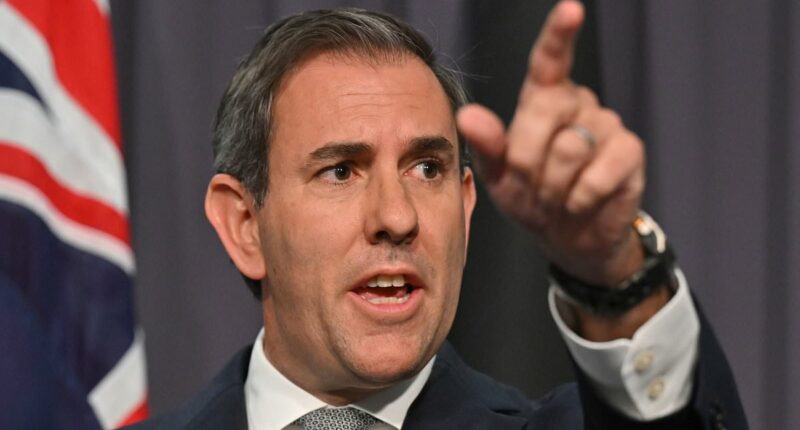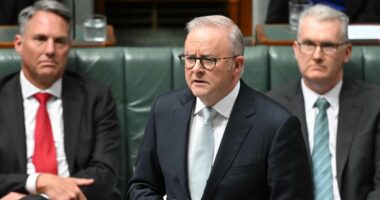Share this @internewscast.com
Treasurer Jim Chalmers has announced significant changes to Labor’s contentious superannuation tax proposal, following strong opposition due to concerns it would negatively impact Australians with increasing savings.
Responding to retirees’ concerns, Chalmers revealed that the Albanese government’s tax on earnings from superannuation balances exceeding $3 million will be adjusted for inflation and will not target unrealised gains, which are merely theoretical profits.
Nevertheless, the policy has intensified as earnings on super balances over $10 million will now face a heightened tax rate of 40 percent, while earnings on balances between $3 million and $10 million will continue to be taxed at 30 percent.
People with less than $3mwould still keep paying the normal 15 per cent rate.
The government expects the $3m threshold will affect about 90,000 super balances while the $10m threshold will capture about 8,000.
By linking the thresholds to inflation, a primary critique of the initial proposal is addressed, ensuring that a growing number of earners won’t fall under the higher tax as wages and prices rise over time.
‘We have always had in our back pocket indexation, or an indexation like this, in order to get it through parliament,’ Chalmers said.
‘For earnings on super balances between $3 and $10m, the rate remains 30 per cent,’ he said.
| PROPOSAL | BEFORE | AFTER |
|---|---|---|
| Thresholds | 30 per cent over $3m | 30 per cent $3m-$10m40 per cent above $10m |
| Unrealised gains | Taxed (even if not sold) | Removed – only realised gains taxed |
| Indexation | Not indexed | Indexed to inflation |
| Low-income offset | $310 | $810 |

Treasurer Jim Chalmers has adjusted the federal government’s disputed plan to increase taxes on large superannuation balances, in response to extended criticism.
‘The rate for over $10m becomes 40 per cent. So this is still a concessional tax arrangement, but it’s better targeted.’
The government has also dropped plans to tax unrealised capital gains – a move that had sparked widespread backlash from accountants and retirees.
Unrealised gains, which are increases in asset value that have not been cashed out, were a significant point of contention for those with self-managed super funds, including farms and businesses, who argued it would unfairly target them.
So in this case, should a person’s super savings go up on paper, that increased value was classified as an unrealised gain which would be taxed.
Dr Chalmers said the changes would make the super system fairer.
‘As treasurer and as a government we always try to take feedback seriously,’ he told reporters in Canberra on Monday.
‘We always try to find the best way through.
‘We found another way to satisfy the same objectives.

Super accounts with more than $3million will continue to face a 30 per cent tax on earnings but the thresholds will be indexed to inflation
‘It means a fairer superannuation system from top to bottom.’
The government will also increase the low-income super tax offset payment from $500 to $810.
While Labor had floated changes to super taxes two years ago, legislation has never been introduced into parliament due to opposition from the coalition and the Greens.
If passed by parliament, the changes would take effect from July 2026, a year later than the expected starting date of the earlier proposal.
On Monday, Dr Chalmers knocked back a suggestion he had retreated on ‘every single point’ of the initial tax proposal.
‘First of all, I don’t accept that because what we’re talking about here is a tax reform in super which makes the system more sustainable – we found another way to do that,’ he told reporters.
‘The prime minister and I have had discussions over recent months about finding another way to satisfy the same objectives and that’s what’s happened here.’
Dr Chalmers said the new plan would raise slightly less than the original proposal in the short-term.
Earnings will likely be significantly lower than expected over the long run, however, given the thresholds will be indexed to inflation.

Prime Minister Anthony Albanese downplayed rumours the super tax was set for a change last week following reports he had engaged with Treasury on the plans
Signs that the tax reform may be due for a change emerged last Thursday when a Treasury official confirmed the prime minister’s office had engaged with the department on the plans.
The following day, Prime Minister Anthony Albanese downplayed the rumours, claiming the policy ‘is as it stands’.
Dr Chalmers also confirmed on Monday he had met with Greens leader Larissa Waters shortly after cabinet signed off on the changes, suggesting it may seek to rely on the minor party’s support.
In a sign their support will be hard-won, however, Greens economic justice spokesperson Nick McKim said the changes don’t go far enough.
‘Labor has stripped out the tax on unrealised gains and indexed the $3 million threshold, a gift to the super-rich that will cost the budget billions,’ he said.
‘This is a capitulation to the wealthiest people in the country, and a slap in the face to everyone else who pays their tax straight out of their pay packet.’
More to come.

















